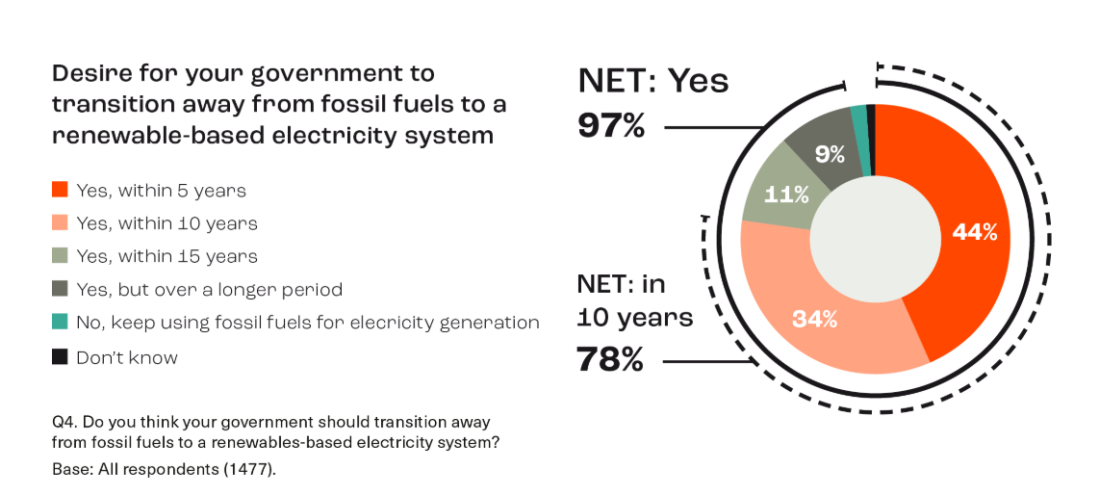An international survey on business perspectives regarding accelerating the shift away from fossil fuels towards renewables was conducted by London-based market research consultancy Savanta, commissioned by E3G, Beyond Fossil Fuels and the We Mean Business Coalition. The results, published as the report Powering up: Business perspectives on shifting to renewable electricity, suggest that companies worldwide are increasingly looking forward to the transition to renewable energy.
The global poll of business executives across 15 countries shows overwhelming support for a rapid transition away from fossil fuels to renewable electricity. The data indicates a global tipping point with 97% of mid-market and large company leaders backing a transition away from coal and other fossil fuels, and nearly 78% supporting the shift to a renewables based electricity system by 2035 or sooner. Survey results indicate that many companies believe that the transition to renewable energy is the best option to ensure economic growth, energy security, and even long-term competitiveness.

Companies’ desire to shift from fossil fuels to renewable energy and accelerate the energy transition is also a warning; if governments do not act decisively to expand renewable energy, many companies may look elsewhere (i.e. relocate).
The main points of this report are below:
Sample for this research: 1,477 business leaders of mid-market and large organisations in Australia, Brazil, Canada, Germany, India, Indonesia, Italy, Japan, Mexico, Poland, South Africa, South Korea, Turkey, UK and US.
Key Points
- Competitiveness is at stake: Half of business leaders say they will relocate their operations (52%) and supply chains (49%) to markets with better access to renewables-based power systems within five years.
- Energy security is paramount: Three-quarters (75%) of executives associate renewables with stronger energy security. 78% of German business leaders believe an accelerated renewable transition will reduce Germany’s exposure to volatile energy imports.
- Economic growth and jobs: 77% link renewables to economic growth, while 75% see them as key to job creation.
- Swift transition from coal: Nearly nine in ten (87%) of business executives who want their government to prioritise investment in renewables want them to stop using coal-fired electricity within the next decade. More than two-fifths (43%) of mid-sized and large businesses plan to transition away from using coal within their own operations by 2030, with over one quarter (27%) intending to follow suit by 2035.
- No room for new gas: Two-thirds (67%) of executives want coal phased out and replaced with renewables, grids and storage- without locking in new gas infrastructure. Even in gas-reliant countries like Mexico, Italy, and Japan, businesses favour a direct transition to renewables. In the United States which has the fourth largest proven gas deposits in the world, almost two thirds (65%) of those polled would rather see a direct transition to renewables in a post-coal era.
- Government policy is lagging: Despite strong corporate backing, many governments lack clear transition plans. In Japan business leaders say they want clarity on renewable electricity’s role within the country’s climate plans, highlighting corporate uncertainty in the investment outlook of Japan’s future power mix. In Canada, where mine closures risk damaging communities, companies are urging workforce reskilling and targeted incentives.
Country highlights: Japan

- Almost all (96%) Japanese senior business respondents to the poll express a desire to transition from fossil fuels to a renewables.
- Almost two-thirds of Japanese corporate leaders (64%) hope for a transition scenario to a fossil-free, renewables based power system by 2035 at the latest.
- The positive contribution that a renewables-based power system could have towards mitigating climate change resonates particularly strongly with many (64%) Japanese executives.
- Almost six in ten (58%) executives want the Japanese government’s electricity policy to identify renewables as the technology of choice in a post-coal era, bypassing gas as an interim alternative.
- Business leaders want the government to prioritise new investments in renewables; nearly two-thirds of whom (65%) back the phase-out of coal power by 2035.
- A persistent request among nearly one third (32%) of business leaders is for clarity on renewable electricity’s role within the country’s climate and energy plans.
It is clear that demand for clean electricity such as renewable energy is increasing worldwide. An annual report published by international think tank Ember also showed that low-carbon electricity (electricity generated by non-fossil fuels) accounted for 40.9% of global electricity generation in 2024.
Additionally, RE100, an international initiative with more than 400 leading companies from all over the world, updated its Technical Criteria to no longer allow members to claim renewable electricity use from co-firing involving coal (ammonia and coal, and biomass and coal). The change in RE100’s technical criteria will be applied to member companies’ reporting in the 2027 CDP disclosure cycle and will affect the evaluation and rating of companies’ decarbonization policies.
It is expected that the reduction of coal-fired power generation will continue in many countries around the world, in response to the strong demand from companies for renewable energy.
Download the report
Global Business Poll: Powering Up
Press Release:New polling indicates global tipping point on business attitudes to renewable energy shift
Country highlights: Japan
Related Information
Co-firing Q&As: RE100’s technical criteria update 2025 (Link)
Results of public consultation on proposed changes to the RE100 technical criteria(Link)
We Mean Business Coalition : 97% of business leaders back the renewables transition(Link)
Written/published by: E3G, Beyond Fossil Fuels, We Mean Business Coalition
Published: April 22, 2025
